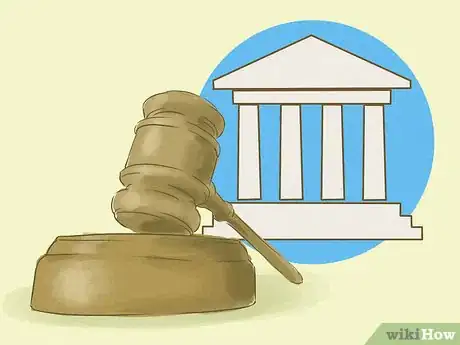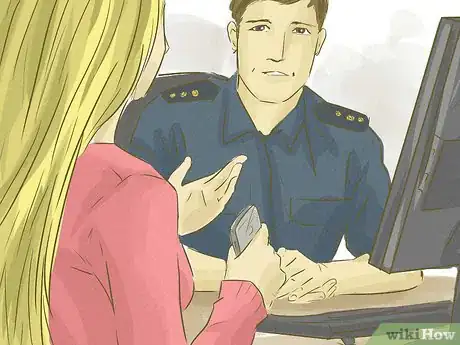This article was co-authored by Clinton M. Sandvick, JD, PhD. Clinton M. Sandvick worked as a civil litigator in California for over 7 years. He received his JD from the University of Wisconsin-Madison in 1998 and his PhD in American History from the University of Oregon in 2013.
There are 13 references cited in this article, which can be found at the bottom of the page.
This article has been viewed 46,946 times.
If you are arrested for Driving Under the Influence (DUI), then you will be taken to the police station and booked. After being booked, you will have to attend one or more hearings in front of a judge. In order to prepare for the hearings, you should understand the purpose of the hearing and what the state needs to prove. Proper preparation often requires the assistance of a lawyer.
Steps
Understanding DUI Hearings
-
1Identify which hearing you are attending. Generally, you will appear in court several times for your DUI (unless you plead guilty). Each hearing will be different.
- Arraignment. At the arraignment you will appear before a judge, who will read the criminal charges against you. You will be asked if you need an attorney. If you cannot afford one, then you will need to apply to see if you are eligible for a court-appointed lawyer. At the arraignment, you will also enter your plea—not guilty, guilty, or no contest. The judge will also decide whether to change the bail amount or release you on your own recognizance.[1]
- Preliminary Hearing. After pleading “not guilty,” you will appear before the judge with the prosecutor. The prosecutor must convince the judge that there is “probable cause” to believe that you are guilty of DUI. The prosecutor can call witnesses. You may then cross-examine the witnesses. Not every state holds preliminary hearings.[2]
- Trial. During a trial, the state and the defendant will choose a jury, deliver opening statements, present witnesses, and deliver closing arguments. The jury is then charged with their instructions and they retire to deliberate.[3]
-
2Understand what the state must prove. At the arraignment, the state does not have to prove anything. However, at subsequent hearings, the state has certain burdens of proof that it must meet. The burden to convict you at trial is higher than the burden at the preliminary hearing.
- At the preliminary hearing, the state must present sufficient evidence to convince a judge that there is “probable cause” that you committed a DUI. If the state does not meet this burden, then the case is dismissed.
- At trial, the state must prove that you are “guilty beyond a reasonable doubt.”[4] This is a higher standard than probable cause. It generally means that the jury must be “firmly convinced” of your guilt.[5]
Advertisement -
3Meet with a lawyer. You should discuss whether or not you want to plead guilty at the arraignment. If you do, then you will avoid both the preliminary hearing and the trial. Instead, you will be sentenced for the crime.[6] An experienced DUI attorney can help you consider your options.
- To find a DUI attorney, you can ask any friends or family who have been charged with DUI. Ask if they would recommend their lawyer.
- If you have no leads, then you can contact your state's bar association, which should run a referral program.
- If you are indigent and do not have the funds available to hire an attorney, you may be eligible for a public defender. If your state classifies a DUI as a criminal offense (either a misdemeanor or felony), you will be able to get a public defender so long as you qualify. If your state classifies a DUI as a civil forfeiture case (i.e., not criminal in nature), you may not be able to get a public defender.
- To see if you are eligible, you will usually go to your county's public defender office and fill out an application.[7]
Preparing to Plead Guilty
-
1Understand when to plead guilty. There's nothing to be gained by fighting a DUI charge if you are actually guilty and the state has proof, such as results from a breathalyzer. In that situation, pleading guilty might be the only feasible option.
-
2Discuss the likely punishment with your lawyer. States have different penalties for DUI. Generally, all states will impose large fines and could also imprison you for up to six months in jail. If this is your first offense, however, you will likely get a lighter sentence. You might serve a few days in jail and have your license suspended for a year.[8]
- If this is not your first DUI, then the judge will look closely at the facts of your case. Typically, the more you were over the Blood Alcohol Content minimum, the stiffer the sentence.
-
3Research drug or alcohol classes to attend. To shorten your sentence, you will probably need to attend drug or alcohol rehabilitation courses, like Alcoholics Anonymous (AA).[9] You can show that you are serious about rehabilitating yourself by volunteering to take a class.
-
4Dress appropriately. You want to look neat and clean when you appear in front of the judge. You need to remember that the judge is looking down on you to see if you are likely to commit an offense again. You should present a “pulled together” image to the judge that conveys you can get your life in order.
- Men should wear long pants with a tucked-in collared shirt. Wear shoes and socks, and make sure that your clothes are pressed and clean. If you have a tie and sports coat, then wear those with your dress shirt.[10]
- Women should wear slacks or a skirt with a nice blouse or sweater. You can also wear a dress provided it is not too provocative. Opt for flats or shoes with a short heel.[11]
- For more information, see Dress for a Court Hearing.
Preparing to Fight the DUI Charge
-
1Contact a bail bondsman. You should be prepared to post bail at your arraignment. If you are unprepared, then you will have to go to jail until you can get sufficient bail. Accordingly, you should contact a bail bondsman before your arraignment.[12]
- For information on how to contact a bail bondsman, see Arrange Bail at No Cost.
-
2Preserve evidence. If you decide to fight the DUI charge, then you will need to make sure that you preserve all evidence of the incident. For example, if you did a field sobriety test, then police could have video of it. Generally, police will only preserve evidence for 90 days. After that, they will destroy it.[13]
- To preserve any evidence that the police department has, you should send a letter to the police department requesting that the video be preserved.[14] Send the letter certified mail, return receipt requested so that you will know that the department received it.
-
3Request the police report. To prepare for trial, you will want a copy of the police report.[15] The report should contain all of the information the officer took down about you during the arrest.
- You can make the request by sending a letter to the police department requesting the report. Keep a copy of the letter and mail it certified mail, return receipt requested.
- If you do not receive a copy of the report within a couple of weeks, then you may need to go to the courthouse and file a motion to compel the release of the police report.
-
4Identify weaknesses in the state's evidence. If you are fighting the DUI, then you need to show that the state's evidence is flawed in some way. There are many defenses that you can use. For example, you could argue the following:[16]
- The officer lacked sufficient reason to stop you or to continue with the investigation. The officer may have relied on a faulty anonymous tip or have racially profiled you.
- The officer's impression of your sobriety was not reasonable under the facts of your case. Officers need some sort of factual basis for inferring your lack of sobriety. If they do not have a valid suspicion, their case could be weak.
- The officer administered the field sobriety test wrong. Perhaps he or she was not trained properly in how to administer them.
- The breathalyzer results are not admissible. The machine may have malfunctioned or not been calibrated properly.
- The chemical tests were compromised. To challenge a chemical test, you will generally argue that because of the science behind this curve, your blood alcohol content was lower at the time of the arrest than at the time of your test. You would argue that, at the time of your arrest, your blood alcohol content was below the legal limit but rose above the legal limit while you were being arrested and processed.
-
5Subpoena witnesses. Other people can be good sources of evidence. For example, if you spent all night with another person, they could testify that they did not see you drink. Alternately, a witness could argue that they never saw the police officer give you a breathalyzer test.
- Generally, you can get subpoenas from the court clerk. You will have to coordinate getting them served on the witnesses.
- Most often, you can serve the subpoenas by using a professional process server or by having them served by someone 18 or older who is not part of the case. To find a process server, search on the web or look in your phone book. A process server generally costs $45-75 per service.[17]
References
- ↑ http://dui.findlaw.com/dui-cases/dui-arraignment.html
- ↑ http://dui.findlaw.com/dui-cases/dui-preliminary-hearing.html
- ↑ http://dui.findlaw.com/dui-cases/dui-trial.html
- ↑ http://dui.findlaw.com/dui-cases/dui-trial.html
- ↑ Posner, Reflections on Judging (p. 65)
- ↑ http://dui.findlaw.com/dui-cases/dui-penalties.html
- ↑ http://oklaw.org/resource/getting-a-public-defender-in-criminal-or-cert?ref=yUgiK
- ↑ http://www.nolo.com/legal-encyclopedia/free-books/beat-ticket-book/chapter8-7.html
- ↑ https://www.freeadvice.com/legal/tips-on-improving-your-situation-before-dui-court/
- ↑ http://www.mass.gov/courts/selfhelp/criminal-law/attire.html
- ↑ http://www.mass.gov/courts/selfhelp/criminal-law/attire.html
- ↑ https://www.avvo.com/legal-guides/ugc/how-to-prpare-for-your-first-appearance-in-dui-court
- ↑ https://www.freeadvice.com/legal/tips-on-improving-your-situation-before-dui-court/
- ↑ https://www.freeadvice.com/legal/tips-on-improving-your-situation-before-dui-court/
- ↑ http://dui-california-arrest.com/dui-california/4-essential-steps-dui-california
- ↑ http://www.riddelllaw.com/columbus-dui-attorney/
- ↑ http://www.serve-now.com/about-process-serving


























































